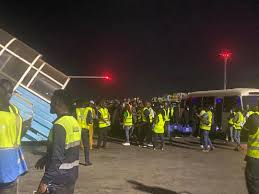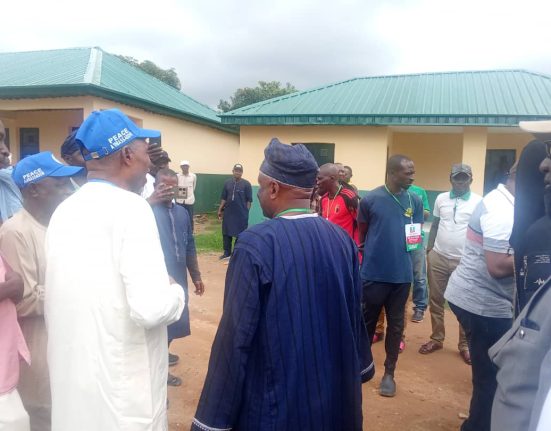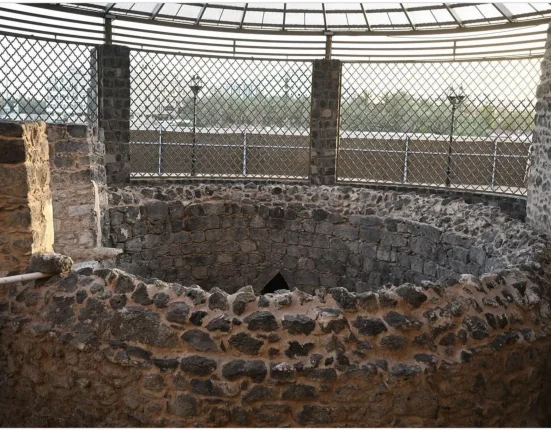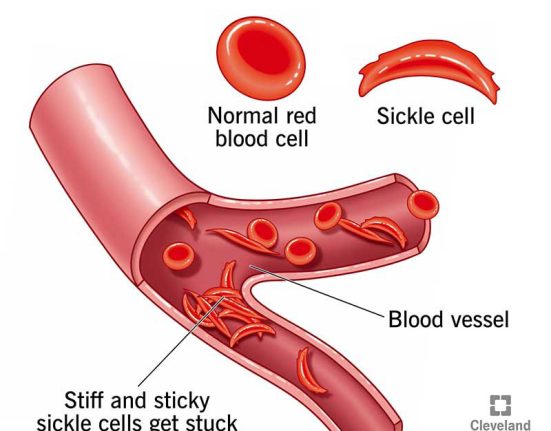The National Emergency Management Agency (NEMA) yesterday coordinated the reception of 144 Nigerian migrants who were repatriated from Libya after enduring harrowing experiences in their attempt to cross the Mediterranean Sea into Europe.
The returnees, looking visibly exhausted but relieved, arrived at the Murtala Muhammed International Airport, Lagos, aboard a chartered flight arranged through a collaborative effort between the International Organization for Migration (IOM) and the Federal Government of Nigeria.
According to NEMA’s Director-General, Alhaji Zubairu Mustapha, who was represented by the Lagos Territorial Coordinator, Ibrahim Farinloye, the group comprised 102 adult females, 24 adult males, and 18 children and infants.
“Today’s operation represents our continuing commitment to protecting Nigerian citizens wherever they may be. These returnees have undergone traumatic experiences, and our priority is to ensure their dignified return and successful reintegration into society,” Farinloye stated during the reception ceremony.
The returnees were received by a multi-agency team including officials from the Nigerian Immigration Service (NIS), Federal Ministry of Health, National Commission for Refugees, Migrants and Internally Displaced Persons (NCFRMI), and several non-governmental organizations specializing in migration issues.
One of the returnees, who identified herself only as Blessing, a 27-year-old from Edo State, recounted her ordeal during a brief interview at the reception center.
“What we experienced in Libya cannot be fully expressed in words. Many of us were deceived by traffickers who promised us good jobs in Europe. Instead, we found ourselves trapped in detention centers, subjected to abuse, and living in constant fear,” she narrated, holding back tears.
The Federal Commissioner for NCFRMI, Dr. Musa Ahmed, emphasized that the government has strengthened its reintegration program to provide the returnees with psychosocial support, skills acquisition training, and small business grants to help them rebuild their lives.
“We have learned from previous experiences that successful reintegration requires comprehensive support beyond the initial reception. Each returnee will undergo health assessments, receive temporary accommodation, and participate in counseling sessions before reconnecting with their families,” Ahmed explained.
Health officials conducted immediate medical screenings for infectious diseases and provided emergency care to those requiring immediate attention. According to Dr. Abiola Adewunmi of the Federal Ministry of Health, most returnees were suffering from dehydration, malnutrition, and psychological distress.
Statistics from IOM indicate that this latest batch brings the total number of Nigerians voluntarily repatriated from Libya since 2017 to over 29,000, highlighting the persistent issue of irregular migration affecting the country.
The Nigerian government, through the Nigerians in Diaspora Commission (NIDCOM), has intensified awareness campaigns about the dangers of irregular migration, especially in states identified as major sources of migrants.
“We are addressing this challenge from multiple angles strengthening border control, prosecuting traffickers, creating economic opportunities at home, and educating vulnerable groups about the realities of the dangerous journey across the Sahara and Mediterranean,” said Hon. Abike Dabiri-Erewa, NIDCOM’s Chairperson, in a statement released following the arrival of the returnees.
Community leaders and civil society organizations have praised the government’s efforts while calling for more sustainable solutions to the root causes of migration, particularly youth unemployment and regional economic disparities.
“While we welcome these rescue operations, we must acknowledge that people will continue to risk their lives seeking better opportunities elsewhere until we create those same opportunities here at home,” noted Emmanuel Obiora, Executive Director of the Migration Awareness Initiative, who was present at the reception.
The returnees will spend approximately two weeks at a transitional facility in Lagos, where they will receive psychological support, skills assessment, and reintegration planning before traveling to their respective states of origin with starter packs to begin their journey toward self-reliance.
This latest repatriation underscores Nigeria’s ongoing collaboration with international partners to protect its citizens abroad while addressing the complex challenges of irregular migration that continue to affect communities across the nation.
General
Hope Rekindled : 144 Nigerian Migrants Return Home From Libya
- by Adeola Abiola
- April 9, 2025
- 0 Comments
- 3 minutes read
- 36 Views
- 5 months ago







